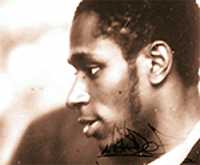In a violent Hip-Hop world dominated by music full of guns, cussing and drugs - Mos Def is a hugely welcome change. Born Dante Beze on December 11th, 1973, Mos has constantly proved himself to be one of hip-hops new-school visionaries - those who break the stereotype of the 'Gangsta rapper' and take hip-hop and rap to new and exciting levels. Indeed, Mos is a precious MC, devoted to his music, with a passion for social consciousness and a divine ability to entertain which will surely cement his place in musical history.
Born in Brooklyn, New York, Mos grew up at the centre of hip-hops golden era of the 1980's. Inspired by the superhero MC's and New School leaders of the time (Rakim, Big Daddy Kane, De La Soul), Mos began rhyming at the tender age of nine. In the 80's most people who were fans of hip-hop were also fans of the culture in some way, but Mos wasn't just inspired by hip hop, he absorbed musical knowledge from across the artistic spectrum, as he himself states; "Im not just inspired by black art, but good art, representations of art that are sincere and genuine"
Encouraged by his younger brother (Medina Greens DCQ), Mos formed his first group with his younger sister - Urban Thermo Dynamics. On their first record - 'My Kung Fu' released in 1994, Mos' talent was clear to see - exhibiting all of his trademark nasal flow and playful scatting. After UTD's brief existence, Mos was invited to join the Native Tounges family, founded by Afrika Bambaataa and including established (and highly rated) artists like De La Soul and A Tribe Called Quest among its members. This provided the springboard Mos needed to build his reputation on his undeniable talent, he went on to make cameo appearances on De La Soul's 'Big Brother Beat' and Bush Babee's 'Love Song'. Record labels sat up and took notice of Mos' charm and charisma (essential to appeal to a crossover, worldwide audience) and his deft, intelligent rhyme skills coveted by the underground movement.
It was only a matter of time before Mos would find his way to a record label, and he chose Independent newcomers Rawkus to showcase his talents. At Rawkus Mos found a label willing to play by 'his' rules - "I liked being a free agent, I liked neogotiating my own terms, working with my own friends" With Mos' new record deal came the instant underground classic 'Universal Magnetic', combining a jazzy beat with Mos' endless stream of pulsating rhymes, and catapulting Mos to an underground favourite. Also in 1996, Mos teamed up for the first time with his soon to be partner-in-rhyme Talib Kweli, producing the legendary 'Fortified Live' collaboration.
In Talib Kweli Mos found a brother with the same beliefs, talent and mindset. Both socially conscious, community activists who saw the larger picture of hip-hop's influence in America and the world. The two then joined to form 'Blackstar', named after the first Negro owned steamship company in Africa, and produced their debut album - 'Mos Def and Talib Kweli Are....Blackstar'. Blackstar was designed to give the two MC's more recognition, the lesser exposed Talib Kweli became an overnight success and Blackstar's first album went on to become one of the most important albums of 1998. Mos tries to explain what Blackstar meant to the duo - "I know this is going to sound corny but - it's about black love and self esteem. These things that me and Kweli say on certain records coming out are our love for our tradition and indigenous people in this country, and about the resilience of the spirit to move forward."
In 1999, three months before the highly publicised end of the millennium, Mos was ready to unveil his first solo album - 'Black On Both Sides'. The RIAA certified Gold album embodies the best of hip-hops past, and peels open the persona of one of its brightest hopes for the future. Bringing to the fore Mos' experiences of life and life as a black person. Mos explains; "So often, artists like myself or Kweli are referred to as alternative or conscious. To me, that's like another code word to diminish your attachments to the community, to black people. You're like this foreign, distant element that people may admire from a distance but they don't have any real closeness to, it's not intimate to them, it's not of them."
Black On Both Sides officially established Mos amongst the elite of the hip-hop circus - at least in the eyes of the critics and those with an appreciation for REAL rap music. Surely with all the talent he posseses it will only be a matter of time before he (and Kweli) become worldwide rap stars. With a new Blackstar album and a new solo album scheduled for release some time this year, 2001 may be the 12 months where the Mighty Mos conquers new shores. But while Mos' music seems to be created to inspire with its vast imagination and ambition, he has a different perspective - "The revolution is personal, I'm not doing this for public acclaim. I'm doing this because it's sincere to me, it's real to me and whoever has feelings about it."
